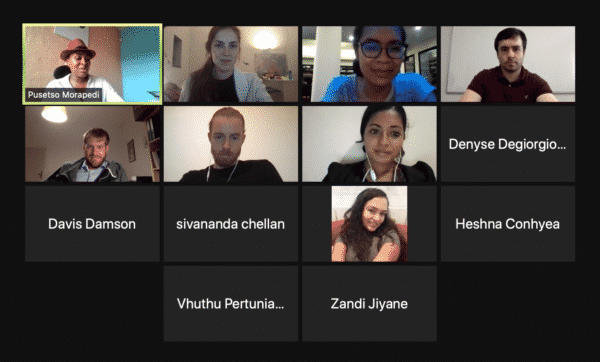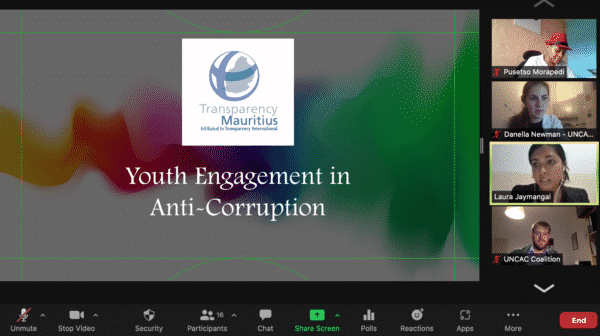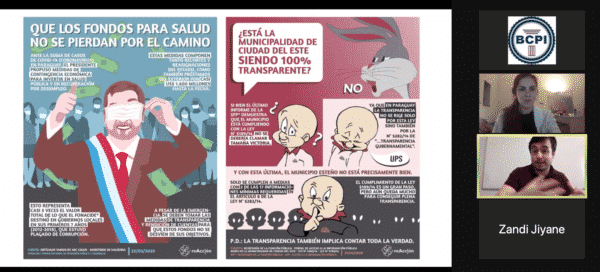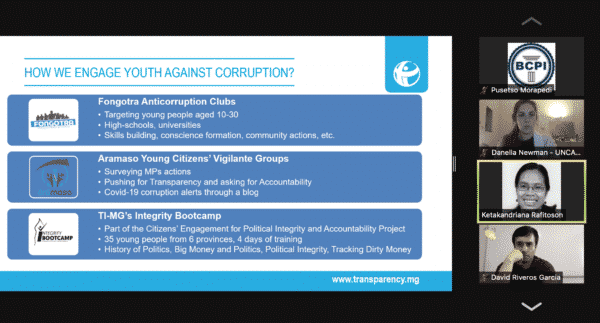2 December 2021 –
Youth represent a big part of the global population, especially in Sub-Saharan African countries, which is why it is essential to engage them in the fight against corruption. As the future leaders of their countries, the importance of integrity, transparency and accountability ought to be cultivated among the youth before they occupy positions of power. Yet, how can we engage young people in concrete ways and how can we integrate youth engagement activities into the broader context of society participation as outlined in Article 5 of the UNCAC? These questions were at the heart of the fourth regional meeting for Sub-Saharan Africa.

The UNCAC Coalition Member organizations TI Madagascar and Transparency Mauritius outlined the many ways in which they engage young people in anti-corruption campaigns in their countries. To provide a best practice example from another region, the NGO reAcción from Paraguay then shared their experiences with involving youth in anti-corruption efforts, highlighting the importance of not simply romanticizing young people as change-makers but seeing them as policy experts, too.
Country experiences with youth engagement
Ms. Laura Jaymangal, Senior Training Officer at Transparency Mauritius, outlined how her organization conducted two surveys on youth engagement in anti-corruption work, which showed that youth were interested but not empowered to actively take part in anti-corruption efforts. Consequently, Transparency Mauritius conducted sensitization campaigns in primary schools, high-schools and universities around the country, meeting more than 1000 young people in the process. These were aimed at raising awareness on how to engage and involve the youth in anti-corruption and transparency work. While this project was stopped due to COVID-19 restrictions, the organization is currently working on a large-scale campaign of awareness raising videos on anti-corruption, which will be shown online and on national TV.

Transparency Mauritius is also conducting a Youth Parliament project, in which 20 youths develop policy proposals on specific topics such as climate change and corruption, which are then given to the prime minister and other stakeholders in Mauritius. For the International Anti-corruption Day in 2019, videos were made with and by youth in which they gave their opinions on corruption and anti-corruption measures which were broadcasted live on national TV (available in French and Creole on the website and YouTube channel of Transparency Mauritius). As youths are most active online, Transparency Mauritius tries to engage them on Instagram, Facebook, etc., and to actively stay in touch with those who took part in their activities to involve them in future campaigns.
Mr. David Riveros Garcia, Executive Director of reAcción in Paraguay, spoke of the importance of youth agency and highlighted that the average age of reAcción‘s team members and volunteers is 23 years. He further underscored that working with students and young people requires communicating the way they are communicating. Therefore, reAccion tries to turn its published data into strategic messages tailored to youth by using memes, infographics, etc.

The organization holds annual youth camps that link young students with local politicians so they can raise their concerns directly with decision-makers. Recognizing the importance of ethical reporting and investigative journalism, reAccion also provides journalism training to high-school students. When the team conducts school visits to the most deprived schools, they take pupils from other schools with them and involve them in the workshops they give to further strengthen anti-corruption awareness and agency among youth.
Through its work, reAccion achieved the reform of Paraguay’s public procurement policy in the education sector, so that citizens can now monitor in real time how funds are being invested in schools and education infrastructure around the country (the tool for real-time monitoring can be viewed here).
Dr. Ketakandriana Rafitoson, Executive Director of TI Madagascar highlighted that Madagascar ranks among the most corrupt countries in the world, due to problems with weak institutions, state capture and a lack of access to information. However, as 62% of the population in Madagascar is under 30 (the average age of the TI Madagascar team is 24) it is crucial to involve young people in governance matters and anti-corruption issues. TI Madagascar has three specific programs aiming to achieve this:
- Fongotra Anti-corruption clubs – targeting young people aged 10-30 in high schools and universities, focusing on building skills, community actions, etc.
- Aramosa Young Citizen’s Vigilante groups – surveying the actions of MPs and pushing for transparency and accountability
- Integrity (Training) Bootcamp – the inaugural boot camp trained 35 young people from six provinces over four days on the history of politics in Madagascar, big money and politics, and how to track dirty money.

Moreover, TI-Madagascar has been campaigning heavily against the embezzlement of Covid-19 funds, an effort in which 700 young volunteers are involved. This shows that young people can be actively involved and make a difference; what is needed is intentional initiatives and programs that facilitate their engagement, involvement and inclusion.
Youth can be both “change-makers and policy experts”
In the ensuing open discussion, participants were alerted against merely romanticizing youth as “change-makers”. While their passion and energy to bring about change are indeed a strength of the youth, young people must show that they can also be the policy experts, by knowing and using data and continually and consistently gaining knowledge. Participants further observed that in schools, there is a big lack of knowledge and awareness on ethics. Besides producing experts in their respective fields, we as societies also need to produce professionals with strong ethical values who can take the fight against corruption forward.



